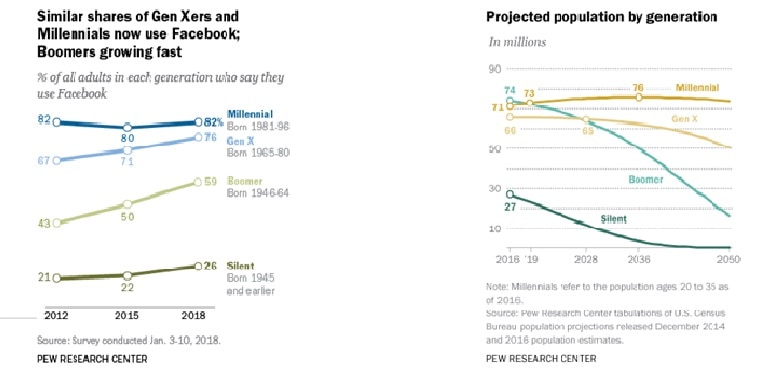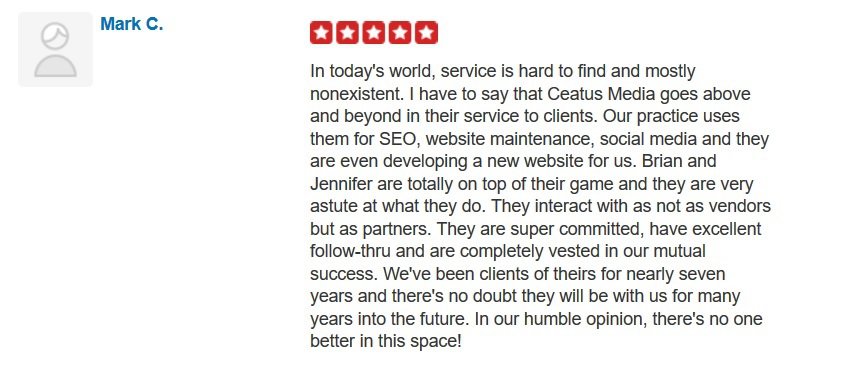August 2019 Ceatus Chronicles: The Decline and Fall of Traditional WOM Referrals
Recent Posts
- Am I getting a good ROI for my Digital Marketing Dollars? 3 Ways to Check Your Digital Marketing ROI
- Should You Hire a Digital Marketing Agency with Experience Representing Healthcare Practices?
- CEATUS CEO Featured by Healio on the Pathway to Purchase for Eye Care and Treatment
- Does Your Website Need to Be ADA Compliant?
- CEATUS Shares Information on Pixel Trackers and HIPAA Violations
Categories
- abdominoplasty
- Articles & Publications
- Articles Published
- Bariatric Surgery
- Botox
- Breast Augmentation
- Breast Implants
- breast lift
- breast reconstruction
- breast reduction
- Bucks County Smiles
- Case Studies
- Cataract Surgery
- cataracts
- CEATUS Courses & Lectures
- CEATUS News
- CEATUS On The Road
- Chicago Plastic Surgeon
- Chicago Plastic Surgery
- Clients
- Content Marketing
- coolsculpting
- Cosmetic Dentistry
- Cosmetic Dentists
- cosmetic surgeon
- cosmetic surgeons
- Cosmetic Surgery
- dallas
- Dental Implants
- Dentist
- Dentistry
- Dentists
- dermatologist
- Digital Marketing Trends
- Dr James Lewis
- Dr. Humberto Palladino
- Dr. Vanessa Voge
- Dry Eye Institute
- drye eye treatment Philadelphia
- eye care
- eyelid lift
- Eyelid Surgery
- Facelift
- Facial Plastic Surgery
- fraxel
- Gastroenterology
- glaucoma treatment
- Greenhich Smartlipo
- Image
- Johannesburg LASIK
- LASIK
- LASIK Cost
- Lead Generation
- Liposuction
- Newsletters
- Ophthalmologist
- Ophthalmology
- Pay Per Click (PPC)
- plastic surgeon
- Plastic Surgeons
- Plastic Surgery
- Practice and Business Management
- Reviews & Reputation
- Search Engine Optimization
- Social Media Marketing
- Surgeons
- Uncategorized
- Website Design
- Website Management
Archives
- May 2024
- December 2023
- October 2023
- August 2023
- July 2023
- March 2023
- November 2022
- September 2022
- August 2022
- July 2022
- November 2021
- September 2021
- August 2021
- June 2021
- May 2021
- April 2021
- March 2021
- February 2021
- January 2021
- November 2020
- October 2020
- September 2020
- August 2020
- July 2020
- March 2020
- February 2020
- August 2019
- July 2019
- June 2019
- April 2019
- March 2019
- February 2019
- January 2019
- December 2018
- November 2018
- October 2018
- September 2018
- August 2018
- July 2018
- June 2018
- May 2018
- April 2018
- March 2018
- February 2018
- January 2018
- December 2017
- November 2017
- October 2017
- September 2017
- August 2017
- July 2017
- June 2017
- May 2017
- April 2017
- March 2017
- February 2017
- January 2017
- December 2016
- November 2016
- October 2016
- September 2016
- August 2016
- July 2016
- June 2016
- May 2016
- April 2016
- March 2016
- February 2016
- January 2016
- December 2015
- November 2015
- October 2015
- September 2015
- August 2015
- July 2015
- June 2015
- May 2015
- April 2015
- March 2015
- February 2015
- January 2015
- December 2014
- November 2014
- October 2014
- September 2014
- August 2014
- July 2014
- June 2014
- May 2014
- April 2014
- March 2014
- February 2014
- January 2014
- December 2013
- November 2013
- October 2013
- September 2013
- August 2013
- July 2013
- June 2013
- May 2013
- April 2013
- March 2013
- February 2013
- January 2013
- December 2012
- November 2012
- October 2012
- September 2012
- August 2012
- July 2012
- June 2012
- May 2012
- April 2012
- March 2012
- February 2012
- January 2012
- December 2011
- November 2011
The Decline and Fall of Traditional WOM Referrals

Prospective patients who find you through word of mouth no longer pick up the phone — they go online. Here’s how to get them off the Internet and into your office.
Many of your new patients come through word-of-mouth referrals. However, today’s referral patients don’t just pick up the phone and call your office; instead, they go online to learn more about you, your practice and your services before deciding whether or not to book an appointment. And while they are online looking at you, they are looking at your competitors. Therefore, the modern practice must have a strategy for engaging both referral patients and other prospective patients, during their search process. The key is a robust digital presence. What does this include? Your website, SEO, social media and of course, reviews.
Word of Mouth Upended
The advent of the Internet has altered the traditional referral system, probably forever. But fortunately, a comprehensive digital strategy will allow you to engage both referral patients and a broader online audience. The Internet is teeming with potential patients — both those who have already been referred to you and other friends of your current patients who are looking for information on the services you provide. Sounds promising, right? But where to begin? It’s not so difficult. All you need is a strategy that aligns with how prospective patients search for healthcare information.
The Pathway to Failure
Before we begin, here is a true story of where you do not want to be.
At a recent meeting, a busy practice consultant who works with prominent eye care practices across the country, shared an experience she had on the way to the meeting. On her flight, she sat next to a lawyer belonging to the millennial generation. As they were chatting, the subject of LASIK came up. She works with or knows ALL of the top LASIK surgeons in the U.S. and quite a few outside the U.S. The lawyer mentioned that he had been thinking about having LASIK, and since he discovered that she knew all the top surgeons, he asked if she had any recommendations in the DC area. Of course, she did and recommended the most prominent LASIK surgeon in DC.
He was interested enough that when they landed, he immediately opened his phone and looked up the recommendation online. One look at this world-renowned surgeon’s website was enough to turn him off: He looked at the practice consultant and said, “I’m not going to this guy, his website S@#%$”. Wow! What a statement. This is the new reality. No matter how great the quality of your service, how many great ads you run or how many people are referred to you through word of mouth, prospective patients judge you by the quality of your online presence. Period.
The Pathway to Success
Here are the critical elements of a solid digital strategy.
Website: Everyone knows that a stellar, responsive website is a must. And as the story above confirms, aesthetics are very important. But did you know that website code is fast becoming one of the biggest problem areas for many businesses? Your website code must be compatible with Google’s algorithm, because your website can’t rank if your own code blocks Google. And while great code will get you seen, once prospective patients have arrived at your site, you need to wow them with your look, feel and messaging. It is surprising how often thin, or poorly written, content sabotages a prospective patient’s experience. Good content is authoritative, compelling and it converts! More importantly, it establishes you as the expert in the eyes of both Google and potential patients reading about you and the procedures you offer!
SEO: Good search engine optimization, or SEO, doesn’t just happen. Google will not naturally recognize your quality and rank you on top. Real SEO is set up and maintained properly so that it builds your online presence for the services and procedures you need for practice growth, in turn ensuring that your website is compatible with the search engines’ algorithms. When done right, SEO positions your website to achieve high rankings and attract robust traffic. But achieving a stellar online presence is a complex process, particularly as Google changes its algorithm over 600 times per year. Only a handful of digital marketing agencies are really good at SEO and able to take the proper steps to achieve improved rankings.
Reviews: You would have to be living under a rock to be unaware that your reviews and online reputation now play a major role in consumer spending decisions; i.e., patients and customers deciding whether to use your services.
Studies clearly show that good reviews drive revenue up, while negative reviews do the opposite, and in a hurry! Harvard Business School found that the revenue swing of positive-trending versus negative-trending reviews can be as high as 18%. In addition, in a CEATUS internal survey of prospective patients, more than 95% of respondents stated that reviews are important when researching an elective procedure and selecting a doctor. But did you know that without taking any initiative yourself, you are 7 times more likely to receive a 2-star or lower review? The good news is, an effective and active reviews system can take your so-so, or poor, online reputation and turn you into a reviews rock star!
The best reviews systems have three basic components: automated notifications when a new review goes online, an easy and streamlined review solicitation tool that is able to target at least 10 of the top review sites, and an automated feed to post positive reviews on your website and social media. The Ceatus reviews system has all three of these components and more. Ceatus has the only reviews system designed specifically for healthcare practices that need reviews for both the practice and its doctor(s).
For better or worse, your online presence, including your website and reviews, defines the perceived image of your practice, because what prospective patients see is what they think they’ll get. If your website is hard to find, unattractive or out of date, with non-compelling content — or if your reviews are less than stellar, out of date and not spread across a wide array of review sites — you’re going to pay for it one way or another.
Ceatus Can Help!
Ceatus can build a comprehensive digital footprint that makes it easy for your practice to achieve great ROI. Contact us today and ask about our platinum and gold packages. *
*Most Ceatus products and services can be purchased individually.
To Facebook, or Not to Facebook? Ask The Experts!
![]()
Q: Is Facebook a good Social Media platform for reaching Millennials?
A: The short answer is: YES! It is well known that Millennials are very active on the more visual social platforms such as Instagram, and it is often assumed that Facebook belongs, almost exclusively, to the Baby Boomers. This is not true. PEW research data shows that 82% of Millennials use Facebook compared to 59% of Baby Boomers. To put this in perspective, PEW data also shows that, in 2019, there are now as many Millennials as there are Baby Boomers. This means that, in spite of popular dogma, the number of Millennials using Facebook is still greater than Boomers. The bottom line? Facebook is still the most powerful social platform for reaching potential customers of all ages.

Tip of the Month
How to Target Millennials and Grandmas (and Grandpas too)

The statistics say it all: Millennials and Baby Boomers both make decisions about you based on what they see online and on social media — often without visiting your practice or talking to anyone on your staff. This is true even when they receive a word-of-mouth referral!
Millennials are especially comfortable making buying decisions based on Internet research and are now applying the same methods they use on Amazon and other online retail sites to decision-making in the healthcare arena.
But if you think this behavior is limited to Millennials…think again. Baby Boomers spend an average of 27 hours per week online; and like Millennials, they believe what they see. They are also more likely to act on what they see on social media.
The data shows that too much promotion will cause your followers — Millennials, Baby Boomers or otherwise — to, well… unfollow you. So, what to post? According to Facebook executives, you should engage first and then promote. In other words, follow the 80/20 rule. 80% or more should be social and 20% or less should be promotional.
The Bottom Line? Your prospective patients are on social media, so your presence on social media platforms had better be robust, engaging first and then promotional!
What Ceatus Clients Say

Events

ESCRS
Paris, France
September 14-17
Booth D119
Want to see the path to Digital Marketing Success a little more clearly? Stop by CEATUS Booth D119 to find out how!
Join internationally recognized speaker and CEATUS CEO David Evans, PhD, MBA, for his presentations:

“Diversification: Your Key to Digital Success”
Monday, September 16, 2019
9:15-10:15am
“How to Get to #1 in Your Market”
Tuesday, September 17, 2019
2:00-3:00pm
Join CEATUS VP of Marketing, Tamara Evans, for her presentations:
“Targeting Millennials and Grandmas Through Facebook”
Saturday, September 14, 2019
2:30-3:30pm
“Next Generation WOM: How Social Media is Changing the Way Patients Find You Online”
Monday, September 16, 2019
8:15-9:15am

ASPS
San Diego, CA
September 20-23, 2019
Booth 1925
Could your online face use a lift? Make sure to visit us at Booth 1925 to start beautifying your online reputation!
Join internationally recognized speaker and CEATUS CEO David Evans, PhD, MBA, for his presentations:

AAO
San Francisco, CA
October 12-15
Booth 138
“The Key to Digital Success? Diversification (and the Data Proves it)!”
Monday, September 16, 2019
9:15-10:15am


